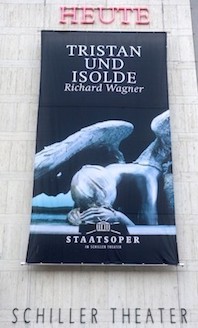
By David May
The Berlin Staatsoper staged an unforgettable performance of Tristan und Isolde at the Schiller Theatre in Berlin on 28 December last year, which I was lucky enough to see.
The production, by Harry Kupfer, has apparently been around for some years now and it is easy to see why it remains a favourite with the Berliners. The simplicity of design (a giant statue of a fallen angel which rotates to provide various perspectives, serves as the set for all three acts) matches the conceptual approach, which focuses on all the relationships. The intensity of the metaphysical bond between Tristan and Isolde is paramount and clearly conveyed. Additionally, Kurwenal, King Marke and Brangane are not just “extras” to the drama, but their own stories have intensity and complexity.
Daniel Barenboim conducted the Berlin Staatskapelle in amazing form. Barenboim’s conducting is not to everyone’s taste. In 2013, I heard him conduct the Ring Cycle at the same location and was struck by the unique timbres he extracts from each instrumental section. The brass especially are coaxed to produce a full and rich sound, which, while less evident in the orchestration of Tristan, creates an aurally stunning impact. On this occasion, even more than in the Ring, I was struck by how the strings produced timbres, which made the most familiar music seem new and re-energised. This was especially evident in the anguished repeated rising four note motive in the Act 3 Prelude and the ecstatic surges of the Prelude to Act 1. It isn’t a subtle reading of the score, but it’s an engrossing and polished romantic view, which gripped the audience from beginning to end.
The supporting cast was outstanding. Roman Trekel made a solid Kurwenal and he is an intelligent actor. Ekaterina Gubanova delivered the strength of tone for Brangäne, contrasting well with the tone of Isolde, yet delivering the most dreamy warning I have heard.
To hear Rene Pape as King Marke was the ultimate in luxury casting. In many other’s hands the Act II monologue can be tedious, but with the combination of Pape’s beautiful sonority with Barenboim’s deft expression and pacing (and some magnificent solo wind playing), the moment is a joy. In the right hands this often-maligned stretch of music can stand majestically on its own, as is seen in its inclusion as an item in Pape’s album Gods, Kings and Demons (again with the Staatskapelle).
Peter Seiffert was a strong Tristan. Here is an outstanding singer/actor. I have never heard him in a recording that does him justice. In the theatre, he delivers as good a Tristan as you will hear anywhere. The detailed delivery of phrasing in the Act 2 duet may have seemed a little fussy to some, but I found it suited the style perfectly, emphasising the music’s ability to capture the subtlety of the emotions.
The long stretch of monologue in Act III (another potential moment where audience attention can fade) was gripping in its building intensity. Once again, Barenboim’s control and shaping of the shepherd’s sad tune fragments, floating in and out like Tristan’s consciousness, was mind blowing.
But the greatest factor at work that night was the Isolde of Waltraud Meier. There can be few in the history of performances of this work who have matched such an amazing vocal timbre and style with the most sensitive and expressive dramatic portrayal. Meier’s dramatic skills are worthy of the greatest stars of stage and screen. Her facial expressions and body movement are mesmerising and add incredible complexity to the character. To watch the drama of the intense emotional development of Act I was almost too much to bear when combined with Meier’s vocal magic and Barenboim’s intense and colourful musical direction. In the 2013 Walküre, Seiffert and Meier brought the house down with their Siegmunde and Sieglinde. My expectations were high for the Act II duet. I was not disappointed. This was something very special.
Meier is approaching 60 years of age but her vocal and physical presence give no indication of this. Only in the opening moments of the Liebestod were some pitching problems evident, though I felt probably brought on more by the intention to convey the intensity of the dramatic moment. In any case, the problems were short lived and the audience experienced the Liebestod as an emotional tidal wave.
